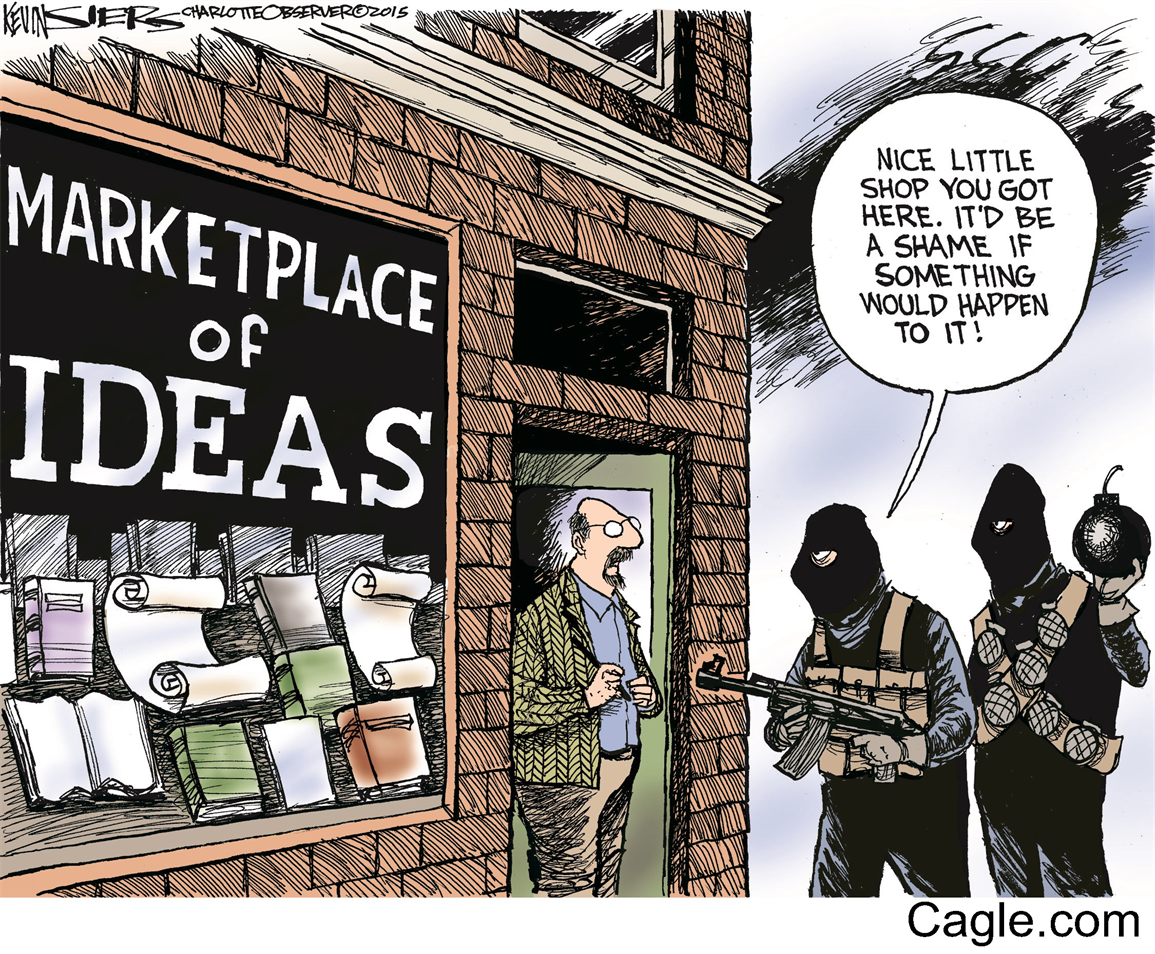 Image from Cagle.com - Kevin Siers, Charlotte Observer 2015
Image from Cagle.com - Kevin Siers, Charlotte Observer 2015
Recently there have been several highly publicized protests of speakers on college campuses. Most, but not all, of these speakers have been associated with conservative politics or viewpoints that challenge current ideas on social justice (Ann Coulter, Milo Yiannopoulos, Charles Murray, etc). At Heterodox Academy and across most mainstream news outlets, academics and college administrators have spoken up about the possible threats to free speech on campus posed by student groups protesting to silence these speakers. They argue that the best way to combat speech you do not agree with is more speech, and that when those speakers are silenced, their ideas are never openly challenged.
While many free speech-defending academics uphold the university as a “marketplace of ideas” (John Stewart Mill), this is a tired notion that is no longer true. There is a new marketplace of ideas, and it is the Internet. On the Internet, controversial speakers on both the Left and the Right have a free platform to generate and promote their ideas to the public. The internet is widely available for consumption, at home or on the go - much more widely available than a lecture hall on some college campus. A university talk is no longer the place where ideas are batted around in search of the truth - it is now where books and podcasts are hyped to increase sales.
How could students protest a speaker if they did not already know their platform? It is easy to research Milo, or Ann Coulter on the Internet today and know their viewpoint in five minutes. Campus talks are no longer required to gain insight into opinions you may not agree with - most of us carry the tools we need for that in our pocket or backpack. We are now living in a world where opposing opinions are easier to come across and argue against than ever before, just scroll through the comments section of any news article to see for yourself.
This ability for individuals across the political spectrum to voice their opinions on the Internet unfettered has recently come under attack. Back in 2015, the FCC adopted rules to protect net neutrality, meaning Internet service providers (ISPs) could not interfere with the generation or access of information on the web. At the time, this was seen as a victory in protecting free speech across the Internet. However, in May 2017, the new FCC chairperson appointed under President Trump, Ajit Pai, has spearheaded actions to roll back these FCC rules protecting equal access to material on the Internet.
And this is what is so baffling about the deafening silence from academics when it comes to net neutrality. On the one hand, student protests on campus are seen as a real threat to the rich variety of thought at our universities. On the other hand, when the largest democratic arena of free thought has its freedom threatened by large Internet service providers…there is hardly an objection. Where is the academic concern over ISPs gating the kinds of information you can find on the Internet?
This is an issue far more dangerous to free speech than a conservative podcaster having their invited talk on campus canceled. The number of total students across all universities (20.5 million in the U.S) is dwarfed by the number of people using the Internet (240.7 million in the U.S) to inform their opinions.
The real outrage on campus should be focused on these academics who have yet to respond to the largest threat to free speech yet. I call on my fellow academics (students, faculty, and the professorship) to redirect some of the energy being spent on campus climate towards the greater threat of a less accessible Internet.